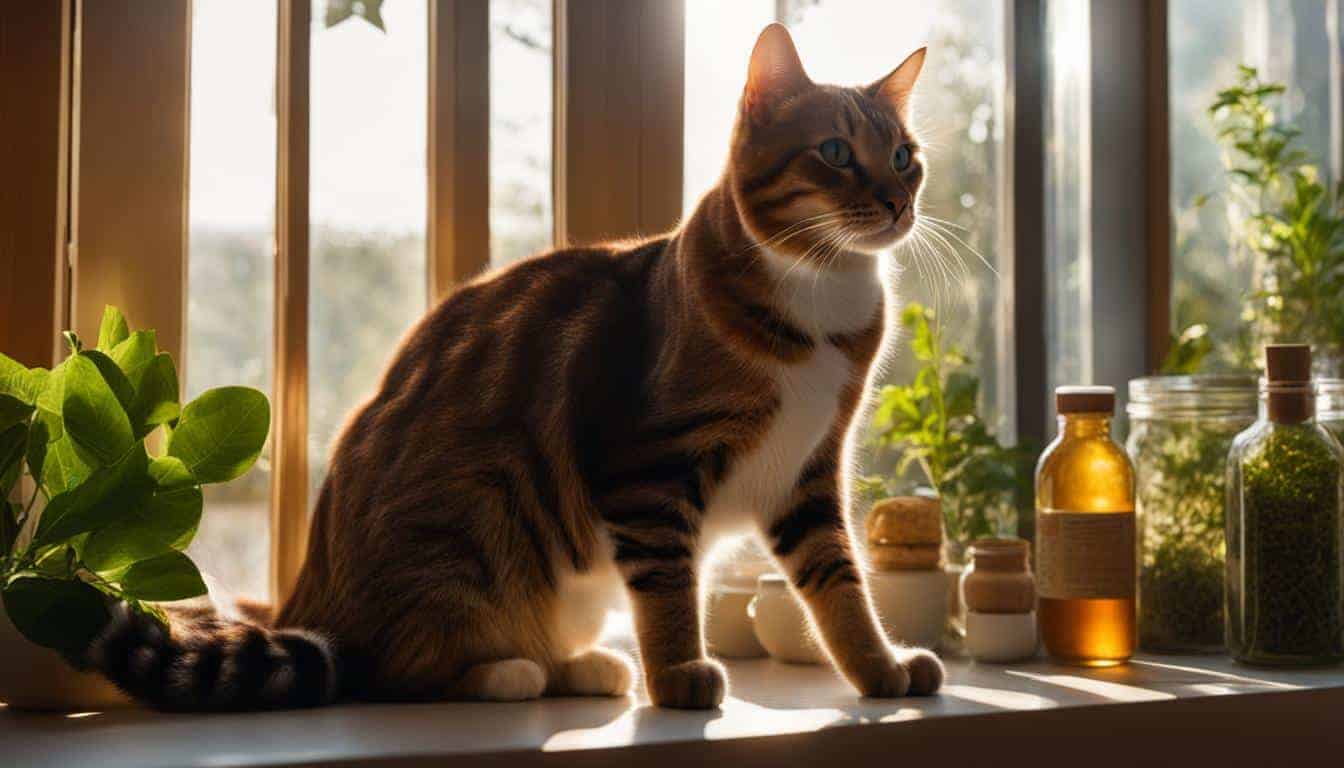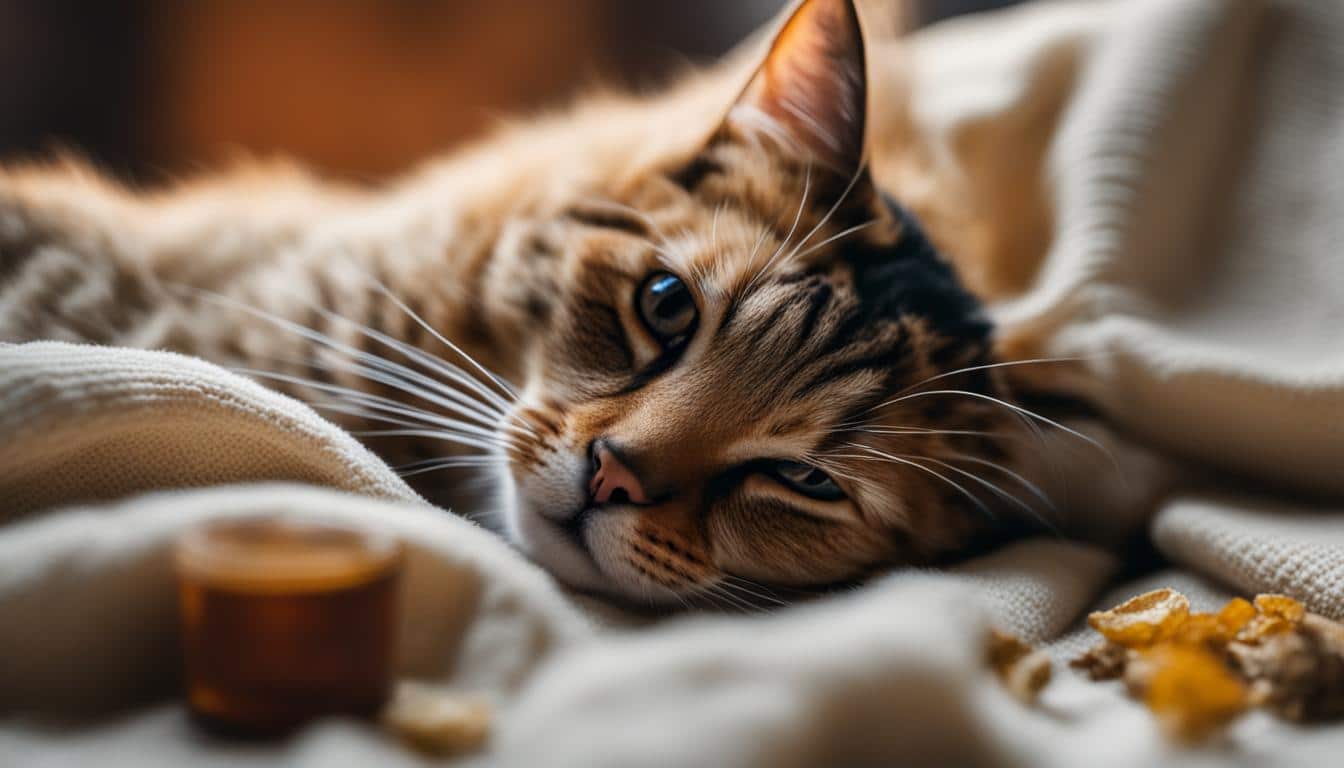Cats can experience coughing for various reasons, ranging from respiratory irritants to underlying health conditions. While occasional coughing is normal, persistent or severe coughing may require medical attention. It’s important to identify the underlying cause of your cat’s cough and seek appropriate treatment for a rapid recovery.
In this guide, we will explore various treatment options and natural remedies that can help alleviate your cat’s cough and improve their overall well-being.

The treatment for cat coughing depends on the specific cause. There are various remedies you can take to manage your cat’s cough at home, including:
Key Takeaways |
|---|
| Identifying the underlying cause of cat cough is crucial for effective treatment. |
| Seek veterinary attention if your cat experiences persistent or severe coughing. |
| Natural remedies such as steam therapy and honey can help soothe your cat’s cough. |
| Medications prescribed by your veterinarian may be necessary to address respiratory infections or chronic conditions. |
| Creating a clean and irritant-free environment can prevent or reduce coughing episodes in cats. |
Recognizing Symptoms of Cat Cough
If your cat is coughing, it is important to pay attention to the accompanying symptoms to help identify the underlying cause. Here are some common signs to look out for:
- Sneezing: Cats with a cough may also sneeze frequently.
- Wheezing: You may notice a wheezing sound when your cat breathes.
- Difficulty breathing: Cats with a cough may exhibit labored breathing or rapid breathing.
- Coughing up hairballs: Sometimes, a cough in cats can be accompanied by the occasional hairball.
- Weight loss: If your cat has been coughing and losing weight, it may indicate a more serious condition.
- Coughing with blood: Coughing up blood is a red flag and requires immediate veterinary attention.
If your cat is exhibiting any of these symptoms, it is recommended to consult a veterinarian for a proper diagnosis. While occasional coughing may not be a cause for concern, persistent or worsening symptoms should prompt a visit to the vet. Early detection and treatment can help your cat recover more quickly and ensure their overall well-being.
“Observing your cat’s symptoms and seeking timely veterinary care is crucial when it comes to managing a cat cough. Don’t hesitate to reach out to a professional if you have any concerns about your feline friend’s health.”
Treating Cat Cough
When it comes to treating cat cough, the approach depends on the underlying cause.
In some cases, simple home remedies can help alleviate symptoms and promote healing. For instance, if your cat’s cough is due to respiratory irritants, such as dusty litter or cigarette smoke, removing these triggers from the environment can make a significant difference.
Similarly, if the cough is caused by a respiratory infection, your veterinarian may prescribe medications such as antibiotics or antiviral drugs to address the infection.
For cats with chronic conditions like asthma, managing the cough involves a combination of medication and environmental changes. Your veterinarian may prescribe bronchodilators or corticosteroids to reduce inflammation and open up the airways.
In addition, minimizing exposure to potential triggers like pollen or mold, and keeping the indoor air clean and free from irritants, can help prevent coughing episodes.
In more severe cases, such as pleural effusion or cancer, surgical interventions or specialized treatment options may be necessary.
Pleural effusion, which is the buildup of fluid in the chest cavity, may require drainage procedures or the use of medications to address the underlying cause.
Similarly, cancer treatment options may include surgery, chemotherapy, or radiation therapy, depending on the specific diagnosis.
Managing Cat Cough at Home
While seeking veterinary care is crucial for an accurate diagnosis and appropriate treatment, there are things you can do at home to help manage your cat’s cough. Here are some tips:
- Keep your cat’s environment clean and free from irritants like dust or strong odors.
- Ensure your cat has access to fresh water to stay hydrated.
- Provide a balanced diet that supports overall health.
- Follow your veterinarian’s instructions regarding medication administration.
- Monitor your cat’s symptoms and report any changes or concerns to your veterinarian.
Remember, every cat is unique, and what works for one may not work for another. It’s essential to work closely with your veterinarian to develop a personalized treatment plan that addresses your cat’s specific needs.

Few Tips to Preventing Cat Cough
Preventing cat cough is an important aspect of maintaining your cat’s respiratory health. By implementing a few simple tips, you can help reduce the risk of your cat developing respiratory infections and experiencing coughing episodes.
Keeping the Environment Clean
Cleanliness plays a crucial role in preventing cat cough. Regularly clean your cat’s litter box to minimize dust and potential irritants. Avoid using dusty litters and opt for low-dust alternatives. Additionally, keep your home free from secondhand smoke, as it can aggravate your cat’s respiratory system.
Vaccination
Ensure that your cat is up to date with its vaccinations. Vaccinations can protect against common respiratory infections, such as feline herpesvirus and calicivirus, which can cause coughing and other respiratory symptoms. Consult with your veterinarian to determine the appropriate vaccination schedule for your cat.
Good Hygiene Practices
Practicing good hygiene can help prevent the spread of respiratory infections. Wash your hands thoroughly before and after handling your cat, especially if you’ve been in contact with other animals. This reduces the risk of introducing pathogens to your cat’s respiratory system.
Tips for Preventing Cat Cough |
|---|
| Keep the environment clean and free from irritants |
| Ensure your cat is up to date with vaccinations |
| Practice good hygiene, especially when interacting with other animals |
By following these preventive measures, you can help protect your cat from respiratory infections and minimize the risk of cat cough. Prevention is key in ensuring your furry companion’s well-being.
Differentiating Cat Cough from Other Coughs
When your cat coughs, it’s important to distinguish between a wet cough and a dry cough to help determine the underlying cause. A wet cough is characterized by the production of phlegm or sputum, while a dry cough does not produce much phlegm. Understanding the type of cough can provide valuable information for your veterinarian to make an accurate diagnosis and recommend the most appropriate treatment.
A dry cough in cats is often associated with conditions such as asthma, inhaled foreign objects, or even cancer. It is usually non-productive and may sound harsh or hacking. Cats with a dry cough may also display other respiratory symptoms, such as wheezing or difficulty breathing.
On the other hand, a wet cough in cats may indicate respiratory infections or lower respiratory issues. This type of cough is typically accompanied by the production of phlegm or mucus. Your cat may cough up phlegm or display other symptoms like sneezing, runny nose, or congestion.
Remember, if your cat is experiencing any cough, whether dry or wet, and it persists or worsens, it’s essential to consult a veterinarian for a proper diagnosis and appropriate treatment.
Summary:
- A wet cough in cats is characterized by the production of phlegm or sputum, while a dry cough does not produce much phlegm.
- A dry cough is often associated with conditions like asthma, inhaled foreign objects, or cancer.
- A wet cough may indicate respiratory infections or lower respiratory issues.
- If your cat is coughing persistently or the cough worsens, seek veterinary care for a proper diagnosis and treatment.
| Cough Type | Characteristics | Possible Causes |
|---|---|---|
| Dry Cough | Non-productive, harsh or hacking sound | Asthma, inhaled foreign objects, cancer |
| Wet Cough | Production of phlegm or sputum | Respiratory infections, lower respiratory issues |

Can Cats Get Kennel Cough From Dogs?
While cats can be susceptible to respiratory infections, they do not usually contract kennel cough, which is more common in dogs. Kennel cough is caused by specific bacteria and viruses that affect the respiratory system in dogs. However, some of these pathogens, such as Bordetella, can also affect cats. It is important to note that the transmission of respiratory infections between cats and dogs is rare, but not impossible. To prevent the potential spread of respiratory infections, it is important to isolate any sick pets and seek veterinary care for proper diagnosis and treatment.
In cases where both cats and dogs are affected by a respiratory infection, it is essential to follow proper hygiene practices to minimize the risk of transmission. This includes washing your hands thoroughly after handling a sick pet and avoiding close contact with other animals while they are ill. Keeping your pets’ living spaces clean and regularly disinfecting their belongings can also help prevent the spread of respiratory infections.
If you suspect your cat may have been exposed to kennel cough or any other respiratory infection, it is important to consult with a veterinarian for a proper diagnosis. They can assess your cat’s symptoms, perform any necessary tests, and recommend the appropriate treatment. Early intervention is key to ensuring your cat’s well-being and preventing the spread of contagious illnesses.

Treating and preventing cat cough requires understanding the underlying causes and taking appropriate actions. If your cat is experiencing persistent or severe coughing, it is essential to consult a veterinarian for a proper diagnosis. Early intervention can lead to a faster recovery and improved quality of life for your furry friend.
Treatment options for cat cough vary depending on the cause. This may include medications to address infections or manage chronic conditions such as asthma. It is crucial to follow your veterinarian’s guidance and provide any necessary medications or supportive care at home.
Preventing cat cough involves creating a clean and irritant-free environment for your cat, regular vaccinations, and good hygiene practices. By taking these preventive measures, you can help reduce the risk of respiratory issues and keep your cat healthy and happy.
FAQ
What are some common causes of cat coughing?
Cats can cough for various reasons, including respiratory infections, asthma, pleural effusion, inhaled foreign objects, cancer, trauma, and heartworms.
When should I be concerned about my cat’s cough?
While occasional coughing is normal, persistent or severe coughing should prompt a visit to the vet. Other symptoms to watch for include sneezing, wheezing, difficulty breathing, coughing up hairballs, weight loss, and coughing with blood.
What is the treatment for cat coughing?
The treatment depends on the underlying cause. It may involve removing irritants, addressing respiratory infections with medications, managing conditions like asthma, removing pleural effusion or foreign objects, or treating cancer or trauma. Follow your veterinarian’s guidance and provide any necessary medications or supportive care at home.
How can I prevent cat coughing?
While not all cases can be prevented, you can reduce the risk by keeping your cat’s environment clean, free from irritants, and avoiding secondhand smoke. Regular vaccinations, good hygiene practices, and keeping your cat indoors can also help minimize exposure to potential triggers and lower the risk of respiratory issues.
How can I differentiate between a wet cough and a dry cough in cats?
A wet cough produces phlegm or sputum, while a dry cough does not. Dry coughs are typically associated with conditions like asthma, inhaled foreign objects, and cancer, while wet coughs may indicate respiratory infections or lower respiratory issues.
Can cats get kennel cough from dogs?
While cats do not typically contract kennel cough, some pathogens like Bordetella can affect both cats and dogs. It’s important to isolate any sick pets and seek veterinary care for proper diagnosis and treatment.

In her previous life, Lisa traveled extensively, both for work and leisure. After the pandemic struck, Lisa locked up her luggage and adopted a cat ever since.
Lisa is now an avid cat lover, she devotes most of her free time serving as butler to her adorable feline at home. When she is not with her cat, she can be seen using her phone sourcing for the latest cat supplies online.


